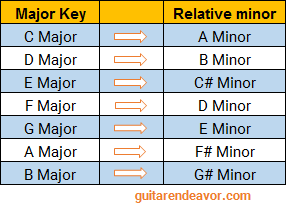The relative minor scale concept is simple yet very powerful and eye opening when you first grasp it. You can use it to write solos and improvise over most popular songs.
The Relative Minor for Guitar Soloing
What Is the Relative Minor and How to Find It?
Every major scale shares the exact same notes as a minor scale. Both scales are said to be relative to one another.
To find the relative minor to any major scale just go down 3 half-steps. On a guitar, this is 3 frets lower.
Another way to approach this is to look at the 6th of any major scale to find its relative minor key.
In other words, a minor scale is simply a major scale starting on the 6th note.
For example, the C Major scale notes are C-D-E-F-G-A-B-C. The notes to its relative minor (A minor) are A-B-C-D-E-F-G-A.
Relative Key Scales Chart

How Is It Different from the Major Scale?
Even though the two scales share the exact same notes they won’t sound similar when played over the exact same chord progression.
This is because they each resolve on a different note. This gives them a major or minor sound.
Also, it will drastically change the way you approach your soloing since you will revolve around different notes.
Here is an example of this over a G major chord progression.
G Major scale played a few times
E minor scale played a few times (relative minor)
Relative Minor for the Guitar Player (Where It Gets Interesting!)
The difference in the previous example is subtle but when playing solos in a popular music context (pop, rock, blues, soul etc.) the relative minor is very handy. You can use it to find which minor pentatonic scale fits best with a major chord progression.
Playing the minor pentatonic version of the relative minor will give you a more rock and bluesy sound.
Here is an improvised example using E minor pentatonic over the same G Major chord progression:
Using It to Write Solos for Basic Rock and Pop Progressions
When improvising, you have to know the key of the song before doing anything. But when playing around a fire camp this might not be clear and you could have to find it rapidly on your own. Fortunately, in a pop context, the first chord of a progression is most likely the root key of the song.
If it has a major sound to it, you can go straight to the relative minor pentatonic to improvise.
You could also see it the other way around and use the relative major of a minor scale to add some colors and get different creative ideas.
When I first understood this I was frustrated, I didn’t know this before! After all, this is such a practical concept!
Now Your Turn!
Let me know what you think or if you have any questions in the comments below.


Hello, good stuff. Wasn’t able to download the backing track. Bit confused about the advice on hearing a song which sounds minor, suggesting I play safe and play the minor root! ? root of first chord in song or the first degree of the key. Thanks anyway.
Hi thanks for letting me know about the backing track problem. I went through a website redesign and lost some of these tracks. I deleted this broken link and will see if I can't put something new up in a near future.
Concerning the root, what I'm trying to say is that (not always) but, generally speaking, in a pop song the first chord sets the key and major or minor nature of the piece. You could also look at where the song ends or look at the different chords it revolves around. You could check out this chart here https://guitarendeavor.com/harmonizing-major-scale-guitar/.
I feel I wasn't clear about using a minor scale over a minor chord progression. For example : If a song is in E min, you could play it safe and use E minor scale. But nothing keeps you from playing the G Major scale to bring more colors.
I hope this helps,
This post really opened my eyes to the concept of relative minors! I never realized how much they could enhance my solos. Can’t wait to experiment with this in my playing. Thanks for the insight!